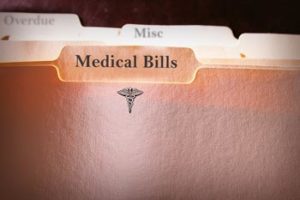After an Accident, Submit Your Medical Bills to Your Health Insurance Carrier

Avoid this Mistake: Not submitting your medical bills to your own health insurance company
Not submitting your medical bills to your own health insurance company is only one of many disastrous mistakes an injury victim can make if an experienced lawyer is not consulted right away.
If you are in a car accident and have your own health insurance provider, make sure you promptly submit your medical bills to your own health insurance company for payment.
This sounds simple enough. However, we often meet with people who were involved in some sort of accident many months ago and had tried to handle the claim on their own. In this situation, it is not unusual to find these people have unpaid medical bills and are in collection with their credit rating badly damaged despite the fact they had health insurance to pay these bills all along.
Who should pay the medical bills?
When we ask these people why they have not previously submitted their medical bills to their health insurance company for payment, we typically get one of two common responses.
One common response is “My health insurance company should not have to pay, because the accident was the fault of the other person, and they should pay.”
Another common response is, “The adjuster for the at-fault person told me to send my medical bills to him.”
If you hear one of these responses, you should still submit your bills to your own health insurance. Let’s look at these responses a little closer.
When the other person is at fault

First, don’t hesitate to submit your medical bills to your own health insurance company after an accident. You have health insurance to pay for your medical bills. Events like car accidents are the reasons why you pay health insurance premiums.
Second, your health insurance company nearly always has a right to recover much of what it paid in benefits from the proceeds of a successful injury case. Therefore, if your case is successful, we will work with your health insurance company to try to make sure they recover what they are entitled to.
Third, there are normally time limits within which you must submit medical bills to your health insurance company which, if not adhered to, will result in your health insurance company being able to deny any payment. So be sure to submit your bills as soon as you can.
When the at-fault adjuster tells you to send him the medical bills
If, after an accident, the at-fault adjuster says “send me your medical bills” many people presume the at-fault adjuster is going to pay the medical bills when they are sent to him. However, if you have listened carefully the at-fault adjuster has said “send me your medical bills,” and has not said, “send me your medical bills and I will promptly pay them.” There is a big difference in these two statements.
An at-fault party or their insurance carrier has no legal obligation to pay anything unless and until there is either a final settlement of the claim or there is a final judgment of the court. It is exceedingly rare that an at-fault company makes any payment for anything except property damage before a final settlement is made or a judgment is entered.
In nearly every instance, the only reason the at-fault adjuster asks you to send him your medical bills is not to pay them, but merely to help determine how much of a reserve his company should set up for your claim. The at-fault adjuster never tells you this and most people end up with the incorrect perception that the at-fault adjuster is going to pay your medical bills when you send them to him. The fact that this happens should serve as a giant red flag to any accident victim who thinks the at-fault adjuster is there to help him.
Avoid this Mistake: Talking Details With the At-Fault Adjuster
Not submitting your medical bills to your own health insurance company is only one of many disastrous mistakes an injury victim can make if an experienced lawyer is not consulted right away. Another mistake we see is talking with the adjuster about the details of the accident.
Except for obtaining the name of the at-fault adjuster, the claim number and the telephone number of the adjuster, it is best not to speak with the at-fault adjuster about how the accident happened or your past or present medical condition before you contact an experienced lawyer who will represent your interests rather than the interests of the at-fault insurance company.
© Bruce A. Beeman
